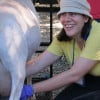by Yigal Deutscher At the core of many of the Shmita values is this sense that we do not own our resources; that, in fact, the resources we call ours are not our property at all. On the Shmita year, private lands become open as commons. Private harvests must be shared with the community. Even private stored foods must be opened to those in need. Food and land are no longer commodities on the marketplace. They no longer carry a price tag. And the people who lay claim to such land and food are transformed from private owners to community stewards, caring for communal property. An emphasis is placed upon the community, beyond the private individual. Perhaps the Shmita year pushed the edge a bit, putting us all in the same position together, where we had to rely on one another, enter into true interdependency, to get by on a such a year. Hopefully, the values of this year framed all others in a way that kept the community threads alive and vibrant, so that there truly was a healthy village culture. And vice versa, so that the community actions and values of the six years between each Shmita helped […]
Author Archive | Hazon
Shmita Work Party: An Embodied Learning Model
The Shmita narrative is one that is founded upon great social ideals and values; as we begin to learn about the holistic, integrated models that Shmita is encouraging, the only way to really begin understanding this is to use the Torah texts as a springboard to action, to experimentation, to embodiment. Yes, there is clear value in learning for the sake of learning and understanding. But as the Rabbis famously ask, which is better: Action or Study? Study, they say, because it leads to action. Study is the first step into personally investing one’s self towards manifesting the values learned in their own personal and communal lives. The Shmita Work Party model is one that begins with text study and follows with a tangible action that directly relates to the values learned. In this way, the learning continues seamlessly into the action, and the words of the text take shape in active creations. For example, one key principle of Shmita is the fact that primary harvests during this year were based upon perennial and wild plants. In a learning session, texts which can be studied would include anything about Shmita harvests, tree planting from a Jewish perspective, etc…and then followed by actual fruit tree plantings. […]
Exploring the ‘Shmita Council’ Model for Your Community
During the Behar campaign to raise Shmita awareness on a local level, one of the models we suggested was to organize a community leadership council. The goal would be to gather together community leaders, such as Rabbis, educators, activists, directors of businesses & non-profits, etc to explore Shmita from the perspective of local needs, resources, and challenges. What would Shmita look like specifically for our own community’s social and economic landscape? For our own community’s educational institutions and community organizations? As community leaders, what specific role might we each take to support this shift towards Sabbatical values? What tangible golas can we reach for, and in what timeframe? Guided by Jakir Manela, the Pearsltone Center hosted such a council for the region surrounding Baltimore, Maryland. Here is his recap for the event, which they referred to as a ‘Shmita Summit’: On Sunday April 28th, Pearlstone hosted our first Chesapeake Shmita Summit, drawing together a select group of local Jewish leaders to learn about Shmita and think strategically together about how its values can be manifest in each of our organizations and throughout our local communities. It was a wonderful conversation, with deep Jewish learning lead by Rabbis Baruch Rock and Nina Beth Cardin—Rabbi Cardin focused on the Shmita […]
Debt Forgiveness as a Foundation for Society
The following post by Rabbi Mordechai Liebling is cross-posted from the Sova Project blog. Studying the Torah laws about debt forgiveness (Shmita) can help us understand how to bring about a more just, equitable and sustainable society. The root meaning of Shmita is to let something drop. When Shmita is addressed in Deuteronomy 15:1-3i, it refers to letting debt drop. To understand the significance of this concept of forgiveness of debt, we need to look at the historical context. The law of Shmita was developed in an agricultural society. Farmers frequently needed to borrow money to buy seeds for the spring planting or to buy food in a time of drought. Not surprisingly, the Torah is filled with stories of drought and famine. In fact, every agricultural society is dependent on loans and therefore produces debtors. Debt leads to inequalities in wealth, the concentration of wealth, indentured servitude and prostitution. If a farmer accumulates too much debt he (men were the principal property owners) may need to sell the land to pay off the debt, or give the land to his creditor in lieu of payment. Or he may choose to sell himself or a member of his family to the debtor […]

מסע האופניים של מכון הערבה וחזון
מסע האופניים של מכון הערבה וחזון הוא הזדמנות מעולה עבורך לחוות את היופי של ישראל ממושב האופניים שלך. יוצאים להרפתקה עם קהילה ייחודית ומגובשת המגייסת כספים לשני ארגונים מלאי השראה: מכון הערבה וחזון. הצטרפו אלינו לחלק מהמסע או למסע מלא של שבוע מירושלים עד אילת, באחד משני המסלולים המוצעים כאן השתתפות ברכיבה “הכל כלול”: לינה, שלוש ארוחות ביום, שתיה וכיבוד בהפסקות בדרך, ליווי מקצועי, טכנאים, ליווי רפואי צמוד, ועוד מירושלים למשאבי שדה רכיבת כביש במשך יומיים מדהימים, מירושלים לאשקלון, ולאחר מכן לנגב הצפוני. אפשרות זו כוללת יום הכנה חוויתי בבית מלון בירושלים הכולל סיור בעיר העתיקה, רכיבת הכנה ברחבי ירושלים, פיקניק ותדרוך מקיף, וכן הסעות חזרה מצפון הנגב לירושלים בסיום הרכיבה 29-31 אוקטובר $עלות הרשמה: 275 גיוס כספים: 1200 $ לישראלים או מי שגר בישראל, 1800 $ לתיירים מסע מלא: מירושלים לאילת לחוות את הרכיבה המלאה עם מעל 100 רוכבי אופניים. רכיבה מירושלים עד אילת כדי לחוות את הארץ כפי שמעולם לא ראית, ממושב של האופניים שלך. המסע המלא כולל יום הכנה בירושלים, שבת קהילתית נעימה ומשמעותית במצפה רמון, ותחבורה חזרה עם תום המסע לתל האביב- בטיסה- או לירושלים- באוטובוס 29 אוקטובר – 5 נובמבר $525 :הרשמה גיוס כספים: 2500 $ לישראלים או מי שגר בישראל, 3600 $ לתיירים
Shmita & The Power of Imagination
This post originally comes from the SOVA Project blog, from May 7, 2013 Written by Adina Allen, a rabbinical student at Hebrew College. In his book To Take Place: Toward Theory in Ritual, Jonathan Z. Smith writes, “Ritual is, above all, an assertion of difference…a means of performing the way things ought to be in conscious tension with the way things are.”[1] Rituals help us to acknowledge the aspects of our world that we desire to change. Through the creation and performance of rituals, we direct our creative energy towards imagining the world as it could be. These rituals create the scaffolding for us to live—even if only for a moment—as if the world we imagine is already here. In Jewish tradition, the observance of the Shmita year, commencing after Rosh Hashana 2014, is such a ritual. The instructions for Shmita observation occur three times in the Torah.[2] These passages include directives that, for one year out of every seven, we are to abstain from planting our fields, allow the land to rest, and welcome the poor of our communities to come and eat from what is ours. In addition, all debts are to be forgiven and those who lack are to be given all that […]
Introducing the SOVA Blog
It is with pleasure that Hazon, the Shmita Project, and the Siach Network are now partnering with the SOVA blog, a new initiative to further raise awareness around Shmita. SOVA is a web-based project helping to stimulate conversation about core issues of sustainability and Judaism, primarily from an economic perspective, in advance of the next Shmita year in September 2014. The SOVA blog can be found at http://sovaproject.org/ Below is the first post from the founding partners of the SOVA team, Dr. Jeremy Benstein, Rabbi Nina Beth Cardin, and Rabbi Or Rose. See the original post here. Welcome to Sova! Sova (“Enough-ness”) is a collaborative effort of the Baltimore Jewish Environmental Network, the Heschel Sustainability Center in Israel, and the Center for Global Judaism at Hebrew College in Boston. The goal of this shared endeavor is to help raise awareness across the international Jewish community and beyond about issues of sustainability—with a particular focus on economic justice—by engendering a multi-disciplinary conversation about such fundamental issues as responsible land usage, wealth and debt, work and rest, fair labor practices, private and public (commons) property ownership, and physical and spiritual revitalization. The recent economic crises in North America and the European Union emphasize the need for renewed collaborative thinking across disciplines […]
[Newsletter May 23, 2013]The Power & Potential of Jewish Retreats
“This place opened my mind to what healthy, vibrant, connected, spiritual Jewish community can look like. It made me hopeful about my own life, spiritually and otherwise.” – Isabella Freedman retreat participant What if your vacation was not only fun and relaxing, but also inspiring, enriching, and connected you and your family to an eco-conscious and diverse Jewish community? What if Jewish retreats can anchor a 21st century Jewish community in communal values and vision that go beyond denominations and local communities, forming a wide network of people whose lives have been transformed by their retreat experiences, who themselves become forces for transformation in the world? Hazon’s merger with Isabella Freedman will provide you with an opportunity to access a variety of retreat opportunities in one of the most enchanting and inspiring places in the world. This Jewish retreat center in the Connecticut Berkshires, which has been living Hazon’s values for many years, will soon be ours to call home. Isabella Freedman also comes with an array of programs that invite you to engage spiritually, ecologically, and creatively with a Judaism in which you can find meaning in your own way, through your own passions and interests. This […]

10 Ways to Make your Shavuot More Sustainable
Here are the Top 10 quick and useful suggestions from Hazon, to make your Shavuot more healthy and sustainable. To find out more information and suggestions from Hazon for Shavuot, visit the Hazon Shavuot Resource Page. 1 – Shavuot Recipes 2 – Understand the Dairy Connection Although everyone agrees that the food of choice for Shavuot is cheese (most typically blintzes, crepe-like pancakes filled with farmer cheese, or a Sephardic [Mediterranean Jewish]equivalent such as burekas, cheese-filled dough pockets), there are differences of opinion (some quite charming) as to why it is a custom. 3 – Choose the Right Kind of Dairy Traditionally, Shavuot is a dairy-laden holiday, with cheesecake and blintzes and burekas up the wazoo. Check out the Hazon Food Audit Toolkit and Food Guide for links to Kosher sustainable dairy providers. 4 – Eat Dairy Responsibly If you are looking to dive into the kitchen, head over to our Healthy and Sustainable Shavuot Menu with recipes and resources to bring delicious local seasonal treats bursting with spring flavor to your dairy-based feast. 5 – Learn about Adamah Dairy Our friends at Adamah have built a thriving dairy operation based on Jewish and sustainable food values. Check out these articles and podcasts on their amazing work: Goat […]

I Grew Up On A Factory Farm
By Yadidya Greenberg I spent the first eight and a half years of my life living on one of Israel’s much-idealized kibbutzim (communal living villages). My mom worked in the kibbutz dairy, and for a time my dad worked with the broiler chickens. I loved milking the cows, and my favorite thing in the world was to let the calves put my entire hand in their mouths. Through these experiences I developed a great fascination and love for animals that has never left me. (more…)
Fundraising Made Easy
Thank you for joining Hazon’s Golden Gate Ride! It’s time to flex your fundraising muscles! This weekend we make your fundraising push. Cycle up that mountain if you will. Fundraising is easier than you think, you just have to get started! Use Hazon’s tools to craft a fundraising plan that will have you reaching your fundraising goal: Don’t reinvent the wheel! Use our fundraising letter writing guide. Start this weekend! Vamp up your fundraising and send your appeal to no less than 40 friends, family, and coworkers. Veteran rider Yesh Ballon shares tricks of the fundraising trade. What are you riding for? Read about the winners of our Mini-Grant Awards [line] Start this Weekend: Raise $1000 in 8 Days The biggest secret to successful fundraising is to ask everyone you know. Think you’ve exhausted your resources? We’ve got a list to help you think of new people to ask. To get a sense of how your whole community can support you in reaching your fundraising goal, consider this recipe for How to Raise $1000 in Eight Days: Donate $50 to yourself Ask 4 family members to donate $50 Ask 10 friends to donate $20 Ask 5 co-workers to donate $20 […]

Challah Memories: Hazon Food Festival Rocky Mountains
My first memory of challah is the smell of it toasting, and then toasting some more, until my grandpa had burned it enough that he would then stand by the kitchen sink and perform his ritual scraping off of the blackened edges. Grandpa ate challah with breakfast every day, and he burned it every day. He may not have known that burning at least some challah hearkens back to the time of the Temple. The word “challah” refers to a bit of baked dough that Jews gave to the priests as a weekly Sabbath offering. To commemorate the ancient law of setting aside “challah,” some Jews to this day separate a small portion of prebaked dough, which they bless and burn. “Challah” means “offering,” and the sweet bread itself is now also known by that name. Funny enough, I learned that history from a book that spells the bread’s name differently: “The Hallah Book,” by Freda Reider. It’s a book I’ve had since 1988, when I got it at a Hadassah book fair, captivated by its many intriguing, artistic suggestions on the shaping of the bread. Lately I’ve been having fun trying out challah recipes and designs, as I prepare […]
reIMAGINE Society: Behar Happenings in the Bay Area
On the weekend of May 3-4, Jewish communities read the Torah portion of Behar, which contains the teachings of Shmita. To honor the Shmita values of abundance, resiliency, and redistribution, Hazon invites you to join us for a full day of great events on May 5, 2013 in Berkeley and San Francisco, CA. In the spirit of Shmita, we are offering most aspects of this community day on the basis of donations, though some of the workshops may cost money. Please share what you can. Shmita Skillshare & Swap Meet Urban Adamah – 1050 Parker Street, Berkeley, CA Edible & Medicinal Plant Walk Golden Gate Park, San Francisco, CA Afternoon Exchange Market & Skillshare Exchange Market – 1:00 – 5:00pm Do you have perfectly usable items lying around your house that you no longer use? Let other community members enjoy them, and find other items you need. Clothing, books, toys, childcare items, kitchen appliances, electronics, tools, art, plants/seeds, etc…Donate what you can and receive what you need! If you’d like to make a gift of your time by volunteering before or during the afternoon events, please contact rebecca@urbanadamah.org. Community Skillshare – 2:00 – 5:00pm Backyard Chickens @ 2pm Worm Composting @ 3pm Come celebrate and explore the art […]

Israel Ride in NYC: With Nigel Savage and David Weisberg
Discover how the Israel Ride can be your next adventure Wednesday, May 8th, 7:30 pm Hosted by Nigel and Liz Savage The Israel Ride: For Yourself. For Israel. For Peace. Meet and hear from: Nigel Savage, Hazon and Israel Ride Founder David Weisberg, CEO of Hazon David Rendsburg, Ride alum and 8-time staff member of the Ride Annie Jacobs, former Program Assistant at the Arava Institute (and current Dairy Apprentice at Isabella Freedman) Arava and Israel Ride alumni They will speak about cycling through Israel, the Middle East’s environmental challenges, and the potential for regional cooperation at the Arava Institute. The Arava Institute Hazon Israel Ride is a weeklong cycling adventure from Jerusalem to Eilat, including 5 fully-supported riding days and a Shabbat rest day. Bring your friends with you | All are welcome at this event!

Why I Ride – Sue Reinhold
I am riding in my third Hazon Golden Gate Ride this Memorial Day Weekend. I first rode because it seemed like a fun way to raise money to do good things in a Jewish way. I next rode not just for that – dayenu! – but for the powerful sense of community I knew I’d get with fellow riders. Where else can you finish gutting out a 60-mile ride through the most beautiful coastal hills imaginable and then turn to study Torah with some kindred text-loving nerds? This year, I ride with some deeper intent. I’ve been thinking a lot recently about my investment advisory firm’s philosophy around investing. My firm is different from many – we invest our clients’ assets with somewhat of a ‘slow money’ approach. Kind of like some people grow and cook ‘slow food,’ we invest patiently around long-term value, and avoid fast-money strategies much as one might avoid fast food (and, our opinion is that fast money, like fast food, is pervasive and ultimately destabilizing to the entire ecosystem in which it is produced). Fortuitously, I attended the Hazon Jewish Food Festival in San Francisco last month and learned with Yigal Deutscher, the manager of […]



